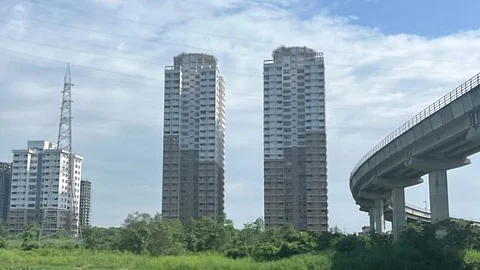

Five years after the demolition of four high-rises in Maradu, Kochi is set to witness another demolition of two apartment complexes. The Kerala High Court, on February 3, ordered the demolition and reconstruction of Chander Kunj Tower B and C, located on the Silver Sand Island in Kochi’s Vyttila, citing severe deterioration owing to “human-induced failures” in construction.
In his order, Justice Mohammed Nias CP noted, “Ultimately, independent reports conclude severe structural issues within the buildings necessitating demolition based on human-induced failures from all involved parties—AWHO (the society), architects, contractors—and the statutory authorities including the Municipality concerned who failed in their statutory responsibilities leading up to this situation.”
Constructed in 2018 by the Army Welfare Housing Organisation (AWHO) for serving and retired Army personnel, war widows, and family members of martyrs, the Chander Kunj Tower was found to have deteriorated beyond repair.
The HC has directed the District Collector to constitute a committee within two weeks to oversee the towers’ demolition and their subsequent reconstruction with equal size and facilities.
The towers, A, B, and C, consisting of 264 dwelling units, were constructed in 2017 by Shilpa Projects and Infrastructure for AWHO at Rs 124 crore. The apartments were allotted to defence personnel from March 2018 onwards.
In March 2024, following an evacuation order by the District Collector, residents began shifting from 208 occupied flats. However, some, like retired Colonel Ciby George, one of the first residents to notice lapses in construction, continued to live there.
For Ciby, who pursued the issue through the police, Magistrate Courts, and later the HC, it was a lonely battle for a long time, until court-appointed committees found that the structural damages were beyond repair.
Ciby bought his flat in 2018 using savings accumulated over his 30 years of service in the Army. As a civil engineer, Ciby was quick to notice cracks in walls. After AWHO dilly-dallied on his complaints, Ciby approached the Consumer Court in 2020.
“The residents’ associations were reluctant as some were still serving in the Army. The long arms of the Army might have reached even the retired officers. So there was strong resistance from within the residents against pursuing the case. Though it was a distressing situation, I decided to take the bull by the horns,” he said.
The Board of Governors of AWHO includes senior Army officers such as the Chief of Army Staff, Vice Chief of Army Staff, and Army Commanders.
A shift in attitude among residents became visible when the District Collector, in an order in March 2023, asked to shift them for immediate retrofitting works to rectify severe damages in the towers. A study by IIT Madras revealed a complex situation regarding building safety, mainly significant corrosion issues linked to high chloride content in the concrete.
“That might have been caused by the use of poor-quality water, sand and aggregate. Corrosion spreads very fast and results in cracks in structures,” Ciby explained.
The Indian Institute of Science (IISc), Bengaluru, was later assigned by the court to conduct a structural audit and study the pros and cons of retrofitting. As per the IISc report, the amount and nature of distress caused due to corrosion and severe cracking made it highly risky for safe occupation. It also found retrofitting infeasible in terms of cost and time.
“It is indeed unfortunate that the victims of all the illegal actions noted above are the Army personnel,” the Kerala HC observed.
The court decided to raze down the complexes considering the study reports of IIT Madras and IISc Bengaluru, and directed the AWHO to disburse Rs 175 crore for reconstruction purposes.
The committee overseeing the demolition must comprise an experienced structural engineer, two owners from the residents’ association, engineers from the municipality and Town Planning Departments, and other personnel, the court added. The committee has also been tasked with recording the circumstances that led to the demolition of the towers and identifying those responsible.
Though Ciby feels vindicated by the HC order, he said that there are still uncertainties about the implementation. He said the committee should establish confidence in affected parties. He also pointed out that the rent suggested for residents — Rs 21,000 and Rs 23,000 — is too low for a thriving area like Vytilla.
“The order has also mentioned that the committee could decide on charging an extra amount to the owners for the new building, which seems unfair. So I have not decided on whether to file an appeal or not,” Ciby said.
He added that a few residents, including himself, are still waiting for clarity on the rent before shifting to a safe house.
Ciby also said that though committees were assigned to study the structural strength of Towers B and C, nothing significant was done on Tower A, a 14-story building located within the same complex.
However, the HC observed that the IISc report mentions a lesser extent of distress in Tower A, which was not severe. The court has ordered the tower to be put under constant observation.